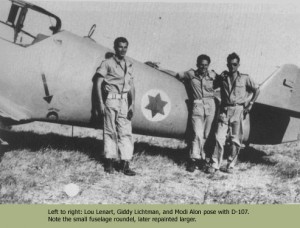
The first time I called Lou Lenart, who died Monday at the age of 94, he said he wanted nothing to do with me.
It was 2009. I was in Los Angeles directing a 10-day shoot for A WING AND A PRAYER, a PBS documentary that tells the story of World War II aviators who risked their lives and U.S. citizenships to prevent what they viewed as an imminent second Holocaust. Since Lou played a key role in this secret, illegal 1948 operation, I figured he’d agree – maybe jump at the chance – to be interviewed.
The WWII Marine fighter pilot declined to even meet for a few minutes.
“I don’t know you,” he said before hanging up.
The second time I got him on the phone, he could no longer use that excuse. It was 2010. I was in Israel working on A WING AND A PRAYER. As luck would have it, Lou, who split his time between LA and Tel Aviv, was around.
“Yeah, I remember you,” he said. “I even heard some good things from the guys you’ve interviewed. Of course, some of them are senile …”
“Is that a yes?” I asked.
“Still a no,” he said.
“Why?”
“I’m too busy.”
At the time, Lou was a year away from 90 and long retired from consulting Hollywood studios on such aviation action films as IRON EAGLE.
“How busy could you be?”
“You’d be surprised,” he said and clicked over to an incoming call.
The third time I rung him, on a beautiful LA morning in 2011, I expected more of the same. I just wanted to hear his freshly squeezed zingers.
“Are you in town?” he asked.
I had just arrived on a Miami-to-LA redeye to screen JESSIE’S DAD at a film festival.
“Why don’t you stop by?” he said.
“What should I bring?” I asked. “OJ? Coffee? Bagels?”
“Your camera.”
What?! I thought. Did he just finally say yes?
Although I had no plans to do any filming during that LA visit, I carried a small video camera for such unlikely occasions. I hopped in my rented compact hoping I’d have enough time to set up the shoot in such a way that its aesthetics would mask the lack of proper equipment, including lights.
But driving from Pasadena to Lou’s place in Santa Monica (and this may not be as shocking to you as it was to me), I got stuck in morning LA traffic. And as soon as I stepped into his one-bedroom apartment, he started sharing his stories. I had no time to set up. I pressed record.
For the next four hours, Lou answered my questions with raw honesty, often shedding tears for his lost buddies; sharp humor, often blaming the British for making a mess out of the Middle East; and humble disposition, giving others, like operation leader Al Schwimmer, the credit.
Lou had always played hard to get: When Al recruited him, when the FBI tailed him and when the ’48 operation took him back to Eastern Europe, where he grew up.
Before flying to Czechoslovakia to train on the subpar Messerschmitt fighter planes Israel had purchased, Lou received instructions from Al to keep his mouth shut until arriving on the base.
“With your Hungarian accent and the Russians taking over Czechoslovakia,” Lou recalled Al telling him, “the last thing we need is you sounding like a defector.”
Some of the other pilots on the journey bet he’d fail – he was too gregarious. They lost their wagers. For Lou, this was just another opportunity to play hard to get.
A couple of weeks later, he took playing hard to get to a whole new level when he dodged anti-aircraft fire as he attacked 10,000 Egyptian troops at the outskirts of Tel Aviv during the ’48 Arab-Israel War.
Leading the first meaningful – and by far, most crucial – Israel Air Force assault, he made three passes over the Egyptian soldiers and tanks, inflicting enough physical and psychological damage to permanently halt their advance and save newborn Israel.
A few weeks after interviewing Lou, I called him again. It wasn’t the first time we spoke since my LA visit. We had become friends and talked often. I phoned to share sad news: Al died the previous day in Tel Aviv. He was 94.
“If you thought I was hard to get, he was impossible,” Lou said. I could hear him holding back tears. “He never agreed to be interviewed.”
“I interviewed him last year,” I said.
“Oh, you bugged him, too, I see,” Lou said. “Good. That’s good.”
Lou cried. I joined him.
This op-ed originally appeared in The Times of Israel. Reprinted with permission from the author.
The words of this author reflect his/her own opinions and do not necessarily represent the official position of the Orthodox Union.